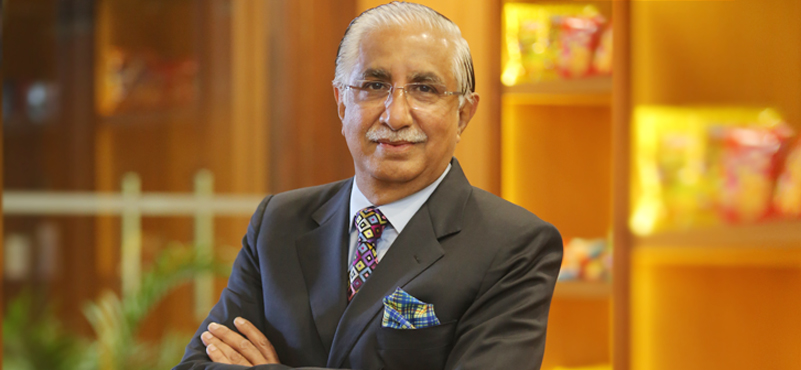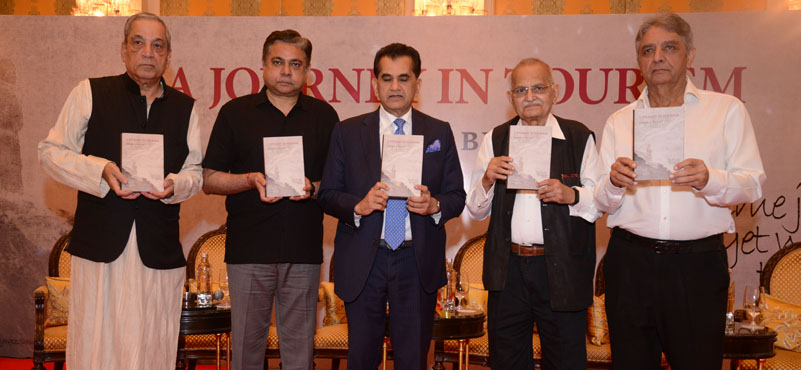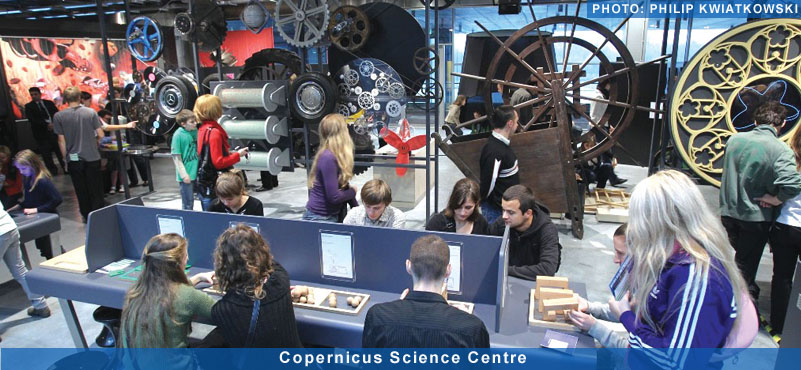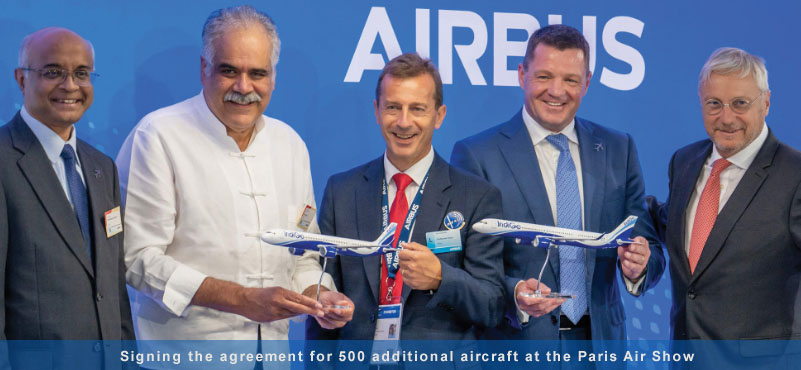It is as sweeping as it can get! Nakul Anand, Executive Director, ITC Limited, speaks on all things travel, tourism and hospitality, in what must be his most extensive interview during his illustrious career. He shares his thoughts on the contours of the business, the changes that the black swan event may force upon sectors, and how ITC Hotels was gearing up for the next decade. Nakul Anand has grown in the industry from being a management trainee at ITC to presently being a Director on the Board, staying with ITC from the start of his career to now. He is the architect of the concept of Responsible Luxury, which has been a Harvard Case Study.
As a distinguished thought leader for the industry, he keeps a low profile, even as he has been the chairman of the industry body, FAITH, since its inception. For all his success, he retains his humility and a sense of purpose, with a hands-on approach to matters of tourism and hospitality. This interview is a testimony to his unflinching commitment to the industry and his unwavering contribution to its evolution and growing understanding as an important economic activity for our country. Here are some excerpts from his recent interaction with Navin Berry, Chief Editor.
Perhaps the best place to start is now. How bad is bad? What is the current scenario on ground zero, as opposed to say six or eight weeks ago?
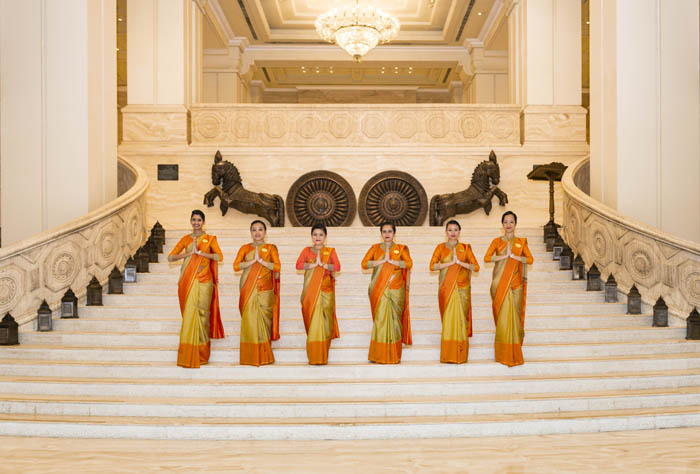
As somebody rightly said that there are decades where nothing happens, and there are weeks where decades happen. This is one such event where I think that we have now close to six and a half million people affected by the Coronavirus. We have nearly four and a half to five lakhs (five hundred thousand) people dead. It is what you would call a black swan event truly, and I think it is more so for the industry.
I could give many such statistics, but I think if I was to look at the global statistics – about two months ago – WTO, the authority on global travel, had said that the drop (in numbers) would be (in range of) 30-35%. Today, it is saying that the figures concerning international travel could be anywhere between 60-80%. That is the extent of the impact that international travel would have as far as COVID-19 is concerned.
In terms of the value, the forecast is anywhere between USD 2.1 to 2.5 trillion. There are various estimates on job losses that go up to 100 million, in the travel and tourism industry.
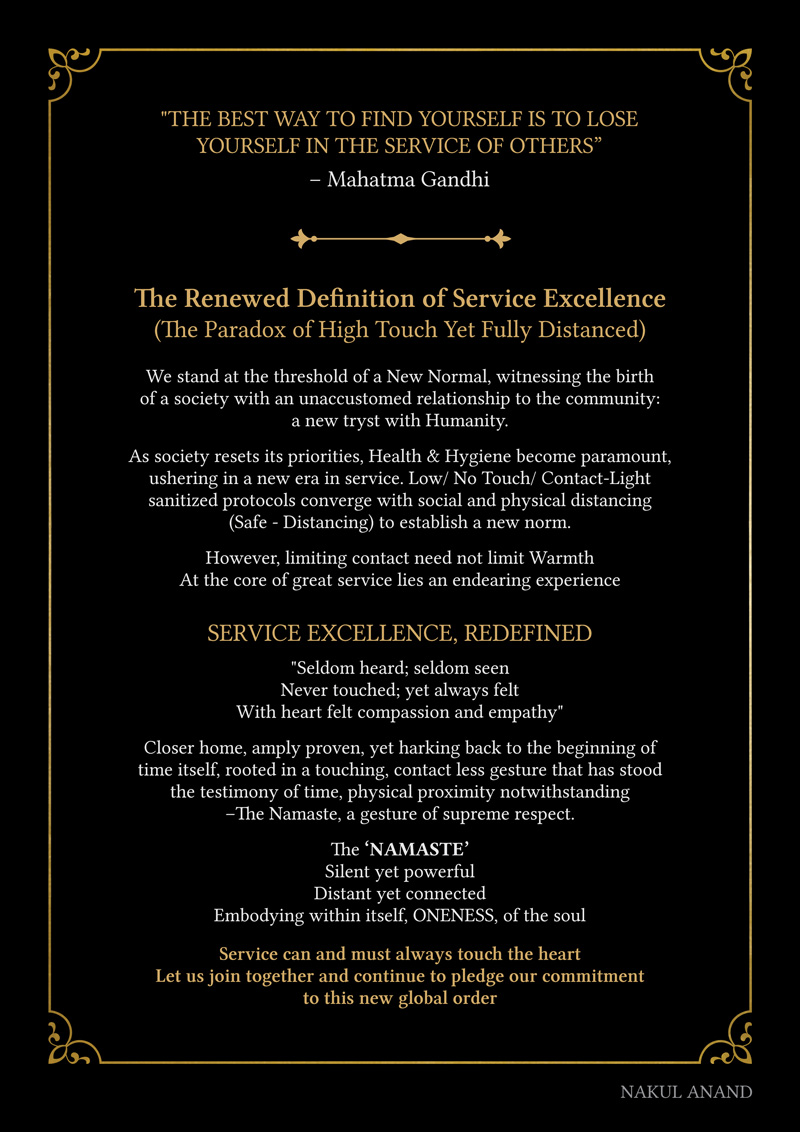
How do you quantify the industry losses?
In India, there are many ways to estimate the impact. I have a straightforward estimate, and I say that we (the travel and tourism industry) are 10 per cent of the GDP – which is an accepted figure by the WTO. India’s GDP is INR 200 lakh crores. Its 10 per cent is 20 lakh crores. I am saying that we would be down by, at least, 50 per cent – which is 10 lakh crores. As the Chairman of FAITH, I had earlier arrived at an estimate of 5 lakh crores, but gradually, over the months, rather over the weeks, I have been upping it. Now I put my figure at 10 lakh crores. And I think that the industry would be down by, at least, 50 per cent.
Beyond figures and financial loses, do you see any bigger impact to stay on? On society and our industry, especially?
More importantly, this is what we call a black swan event where values change. And when values change, much changes with it. It brings about a new world order. Society sort of resets its values and arrives at new priorities, etc. These new priorities always bring about changes. To quote examples, the Black Death ended Federalism and Serfdom; the second World War increased the participation of women in the workforce. You know what happened after 9/11 and how airports became security barricades of a kind. At home again, after 26/11, hotels had to bring in the security aspect when designing new properties to ensure their safety, etc. The 2003 SARS led to a surge in online shopping in China. So, each of these black swan events brings about changes in the value. Events may disappear, but some of these things continue to remain and make a permanent mark as far as we are concerned. This (COVID-19) is one such event that is going to leave a lasting mark.
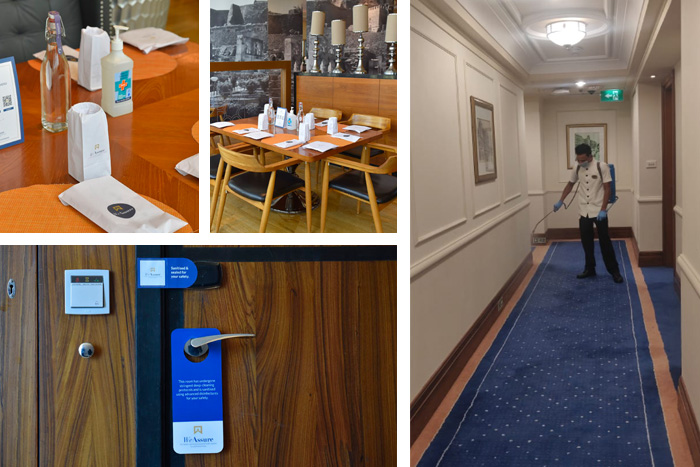
And the lasting impact of this event is largely going to be wherein so far as hospitality will change forever?
I think the most important value is that ‘health is the new ‘wellth.’ Health is moving from reactive to proactive; many years ago, it was felt that the absence of sickness was having health. I think that definition has changed quickly. Your health certificate will become as important as your visa. Remember the old days when you had to carry a health certificate. In South Africa, you had the Yellow Fever and all the rest. The single most important thing that this (the pandemic) has done is told people how vulnerable they are; everything else that has happened is its offshoot. What is the offshoot? People have realised the importance of safety, which assumes greater importance because of what I call the ‘fear of infection.’ Therefore, there is an enhanced focus on ‘distancing’ and ‘disinfecting.’
And how does this translate especially for hotels and hospitality and tourism?
As people have had more time to reflect, as they have been at home, they have realised that nature does not realise the artificial borders that people have set for themselves. And therefore, it is a global order, and the sustainability will also get amplified – the concern for sustainability, the concern for planet Earth.
Cleanliness has become the new amenity. Hotels that used to say ‘location, location, location,’ now have to say ‘cleanliness, cleanliness, cleanliness.’
Additionally, the new ‘normal’ has paved the way for the digital. People have realised that they have to digitalise every service and interaction to keep up with this world order and the fear of hygiene and sanitation, etc. People call it ‘social distancing;’ I call it ‘safe-distancing.’ I don’t think people by nature can socially distance themselves; we are socially wired. I think it is all about safe distancing.
And therefore, what do you see as the road ahead?
There are two things that we need to do. One is that we keep one eye on the microscope because we have got to see how we can reduce the costs, etc. We are going to survive. I remember someone saying, “it is not about capability but cope-ability.” How are you going to cope up in this new world order? We must remember that we are in the service business and hotels are in the luxury business. We can trim the fat but cannot cut the muscle; cutting the muscle will take us to an absolute doomsday.
We have got to keep an eye on the telescope, from a company’s, the industry’s and the country’s point of view. Every storm or disaster brings with itself seeds of opportunities. This is perishable. Those who can capture on it would be gainers as the world recovers.
Having arrived where we have, where do we go from here? How do you see the industry going forward, first asking for relief, and now with the vaccine further away, where do you see our tourism going forward?
People call it ‘before Corona or After Corona’. I see the first stage as the ‘survival’. This is where we can ask the government if they can help us with cash flows, help us conserve our cash, and defer statutory payments to us? We are not asking them to put money into our pockets, but there are payments, and we have cash flows. Defer our loan payments, reduce the interest on our loans and increase the moratorium period. Do not charge us for liquor licenses for this period. Revisiting matters such as the property tax when hotels are not in use – anything to help us conserve our cash at this stage.
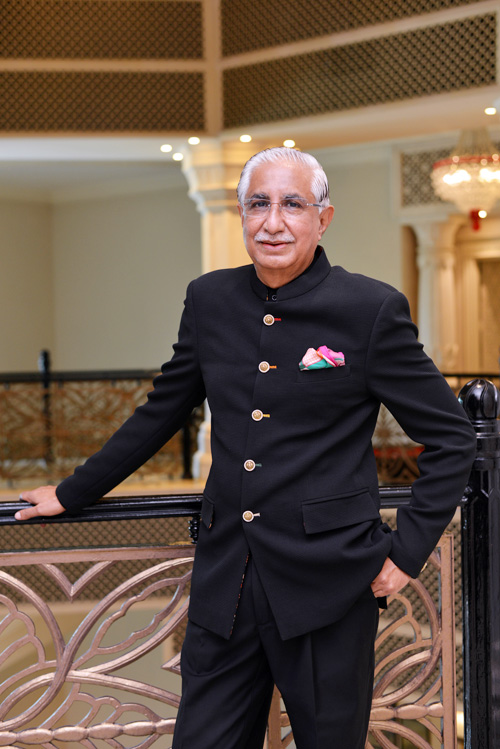 Where would demand come from? The vaccine is still some time away!
Where would demand come from? The vaccine is still some time away!
Going forward, yes, I guess you have to learn to co-exist with this for a year or two years. Even after the vaccine is found, it is going to take some time before somebody is immunised. In this co-existence, international travel is not going to pick up immediately. What is good for India is that if we have 11 million inbound tourists, we have close to 27 million outbound tourists. A substantial percentage of that (outbound) will yearn to travel. I think that is an excellent opportunity. How can we create demand for these people? How can we bring them into our resorts, hotels and cities, etc.? We also heard the PM echoing this, saying how people must see and discover India. That, however, is in the revival phase and we must first survive to revive.
How do you see this domestic demand opening up, and how do you see this developing for the industry?
My understanding is that there is going to be a phased opening up of what I call the ‘revenge holidays’. You and I would love to take a holiday. There is pent-up demand, and in the first phase, we would take holidays to places and destinations to which we can drive – motorable holidays. And gradually, as thing begin to settle down and we become accustomed to the ‘new way of life,’ you and I could take a flight with all the necessary precautions and go forward.
And speaking of inbound, where do you see the next opportunity, given that international travel may be slow to pick up?
This is what I call the ‘telescope’ stage. I think India has a great opportunity to reinvent itself; Incredible India can be more incredible than ever. We need to look at new markets and new trends and how we can create new products for new markets – yoga and Ayurveda. Albeit, we will become more religious after this pandemic, there will be more travel to religious places. How can we capture this? What are these source markets? I guess that long-haul will always continue, but there will be a higher demand for short-haul tourism. Any country that has crossed the 45-50 million tourist mark has a majority of footfalls emanating from within the region.
As an industry, how can we take advantage of this opportunity that you mention? What new strategies do you see for developing of India as a tourist destination?
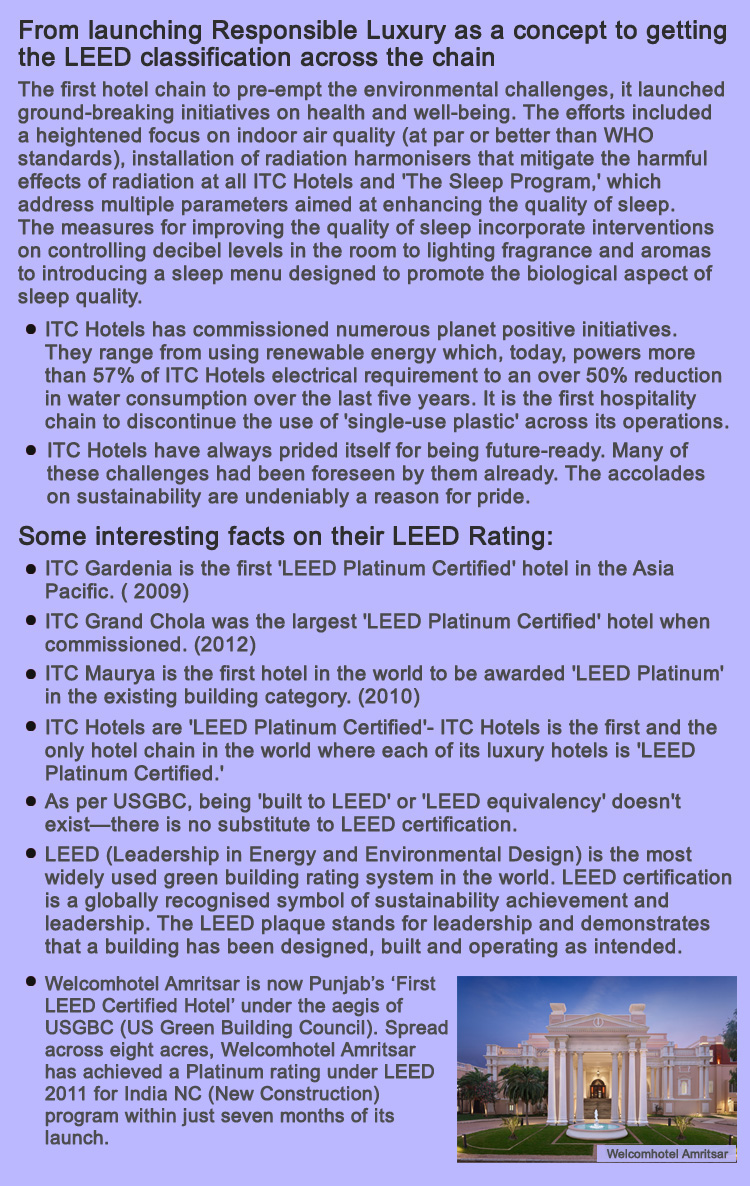 For one, most of the Buddhist countries are within our region. Four out of every five places of Buddhist pilgrimage exist in our country. How can we get those people there? Another, for example, people may be wary about going to China, in the immediate future, at least. What were the source markets of China, and what can we do there? In other words, we look at different products and different markets.
For one, most of the Buddhist countries are within our region. Four out of every five places of Buddhist pilgrimage exist in our country. How can we get those people there? Another, for example, people may be wary about going to China, in the immediate future, at least. What were the source markets of China, and what can we do there? In other words, we look at different products and different markets.
I don’t think we need to push our beaches and jungles, etc., those can be kept for domestic tourism. I think where we have, what I call a purple cow in terms of the unfolding trends, and I see 20 of them.
Where do you see the future of hoteliering as a service industry? How much of it do you think is for keeps even after the vaccine is discovered?
NA: To a certain extent. I don’t imagine safe distancing being practised to such an extent that there would be partitions between tables. But the concern for cleanliness, hygiene, health, food, air quality, that the hotel is clean would exist. Interestingly, I was reading an article the other day, and it had an advertisement for the Holiday Inn, which stressed on clean rooms. It was back in the 1970s. It is interesting how things take a full circle. Hygiene, cleanliness and avoiding contact where it not necessary would become important. If you can avoid contact, and get a superior result, then why not?
Sorry, I quote the example of ‘namaste’ again. Why shake hands when you can convey the same message with a ‘namaste?’ I am using this is as a metaphor; a symbolic explanation of what I am saying. A lot of these would remain. Buildings would get reshaped and redesigned. People would realise that a cleaner building, lesser touchpoints, lesser possibility of bacteria, and such, would only improve my health and can’t do me any harm. So, many of these things are here to stay. This is how I began by telling you that it would bring about changes as any black swan event does. Look at where we are before and after the 26/11. You never had a door-free metal detector and your car being checked; look at the changes brought about by 9/11 to airports. These were permanent changes. You never reverted to the earlier process once you realised that you were vulnerable.
How do you see the future of the spa business? Hotels like yours, with a super brand like Kayakalpa, you have large spaces in every new hotel that are devoted to spas.
NA: It is going to bounce back, but it will take longer to happen. It is a service that won’t bounce back early. We can provide some sort of immunity certification to the people, and I believe that here we don’t have to wait for a vaccine to come out. There is a rapid test kit. It may be able to give us interim relief that I can prove to you that the therapist is absolutely free of any virus. I have always believed that the spa has to do with health. That is why you call them ‘therapist’ and not ‘masseuse.’ And because of the concern for health, you are going to go back to them but with a caveat that you would want some form of certification or proof that the person is not carrying the infection.
So, in the long-term, spas would be back when the vaccine comes, and you have an immunity certificate. In the short-term, a major change in the industry will be the usage of rapid test kits. That is the theory. Spas would still be a longer-term service to make a comeback.
And what about MICE?
Yes, we will find new ways to do them. I think conferences will continue. We may not be able to do conventions of 4000-6000 people. We would have conferences, for the time being, during the Corona-period, you would be safely distant and sitting in the classroom-style configuration, sitting six feet apart from one another. We would have to find ways of serving low-contact meals served to the delegates. Could it be served on the table, could it be pre-ordered? Could it have a buffet of a kind where there is food yet safe-distancing – all this is work in progress.
But do you see MICE happening in the current scenario, six months from now?
I am optimistic about this. I do not know the exact percentages, but I guess that a large part of this 26 million outbound was MICE. Many of these were conferences and destination weddings, etc. They may continue, but you would see smaller numbers.
A lot of them were incentives?
Yes, that’s what I meant. A lot of them were dealer conferences, pharmaceutical conferences, a lot of these. These may continue. They have to continue in the course of business and as we are by nature socially wired as I told you. But instead of taking 500 people, you may initially take 100 or 200 people, but it will come back.
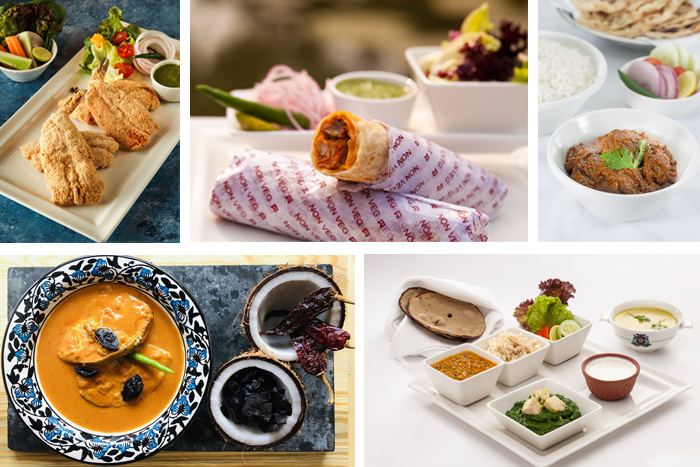
With all the costs involved in maintaining hygiene and sanitation and also the limiting factor of keeping distances, do you see the cost of providing services going up? And therefore, do you think you would be able to maintain the current prices or the cost of these experiences are going to go up?
As far as health safety and hygiene, etc. were concerned, and I can say that with my experience that we launched ‘Responsible Luxury’ 10-11 years ago as a hotel chain. Responsible luxury did not only entail sustainability; green was only a part of it – it included health, hygiene, safety. We had laboratories in all our hotels 20 years ago where microbiologist would carry out random food tests and test the swabs of human hands. We have already been practising a lot of it as a hotel chain.
It does not necessarily mean extra cost; that is the way the business must be done. Yes, there could be some extra cost in terms of sanitising, etc. I don’t think it is going to be a phenomenal cost of that kind. And my own experience tells me that we’ve been very happy with the sort of things we have done. Most of it – healthy food, our research on food and beverages, alert meals that keep you awake even after conferences, are all part of our responsible luxury initiatives. Room service offers a welcome meal, which is a consolidated meal, sort of a buffet on the plate, are all part of our same initiative.
‘Local Love,’ where we offer you local food in each city; what did it do? You would go to a coffee shop in Kolkata; you would see the menu and instead of ordering a smoked salmon, may order a Kathi kebab. We all love good street food, but maybe we don’t want to go out and have it. Ours is a benchmark against the best. So, you order a Kathi Kebab or a local Kolkata Biryani. In Mumbai, you order a Biryani or a Vada Pao.
What does it do? First of all, it enhances my experience because today when I want to travel, I want to feel the city as well, is not it? I want to carry back with me memories and experiences. What it has done overall -something like ‘Local Love’ – it has reduced the footprints of our purchase because I am buying locally. Just for the sake of comparison, imagine if you would have ordered a smoked salmon, imagine the carbon footprints because it would have been flown in from some distant place. We have reduced the footprints of our purchase by 30 to 40 kilometres by having introduced ‘Local Love’ and vastly enhanced the consumer experience. It is all about thinking and creativity, and I say the same thing about service. Service does not have to get commoditised; it does not have to get contaminated. We have just got to touch the heart but find different ways to touch the heart.
Would you be tweaking the tenets of responsible luxury in the future?
Yes, absolutely.
So, what would be, let us say, the top two priorities for you in the now-look responsible luxury?
I think foremost is the concern for health hygiene and safety. The difference is that while we were always doing it, but now we would be providing certification for it. We have tied up with NABH that certifies hospitals. We have tied up with DNB for certifications. From an existing point of view, I would like to reemphasise that we have always been regarded as one of the greenest hotel chains in the world – the first hotel chain to get a platinum rating and we have been getting it year after year. So, if you look at all concerns that the current crisis has thrown up – health, hygiene and safety, we have always had safety audits.
I remember receiving the British Sword of Honour on safety, twenty years ago. I have already talked about our laboratory. We regularly measure our internal air quality. We got gages and technologies that show you what is the quality of air in your room. We got into Six Sigma along with responsible luxury, believe what gets measured gets managed. I think it is all there; we will do a few additions and validations; some measures on distancing, etc. I am fairly happy that as a hotel chain, we had foreseen a trend, whichever way it came in. I think we are very well geared as a hotel chain to take all of this up, acknowledged worldwide; we are Harvard case study.
The marketing and demand that you have to create for your hotels; Is there any kind of revision in the strategy? For instance, if I looked back 20-30 years ago, Delhi used to be a major supply centre for your hotels in Agra and Jaipur. Do you see Welcome Breaks making a comeback?
‘Welcome Breaks’ gave way to some form of staycations. ‘Welcome Breaks’ is a significant part of our business; except we call them luxury getaways and they come in various forms. You could have a culinary one, which is linked with culinary initiatives. It has been a very important part of our offering, and certainly, you will see a lot more of it.
As I told you, ‘right to distances’ is going to be the first area. When you look at our hotels close to Delhi – ITC Bharat, ITC Mughal, ITC Rajputana, etc. – those of us who have our own cars would go in them. We would feel much safer. For those who don’t, we come up with what we call ‘safe cars’ – that pick you up from home and drop you back.
So, firstly you could have a staycation in your own city then gradually, travel to distances of 2-3 hours, and later to 8-9 hours—even motorable holidays overseas. By then, infrastructure for overnight stays, motels and such, will come along the highways. This is the new trend that will emerge. And believe me, if you were to map the radius of every city where there are hotels, it would have catchment areas for motorable holidays. Agra would have Delhi, Jaipur, parts of Haryana, even Lucknow. So, every city would have some catchment areas.
I also believe that business travel is not going to take very much of a backseat. Yes, it is going to take some hit. Remember, we have about 600 million Sq. Ft. of commercial office spaces across India. In the last year itself, the absorption rate grew by 40-41 per cent. So that is the pace at which commercial space was expanding in India. Yes, there will be ‘work from home’, but there, certainly, will be a physical need for travel for business.
So, if I was to look at India, we would begin by staycations, look at the drive-in and drive-thru holidays, then drive-thru to longer distances, then domestic holidays (Apna Desh Dekho). Believe me, some of us are greatly surprised when we get to see the beauty of India. There are great aspects to India that we would never have seen. Push comes to shove; we would end up seeing them. You would have seen them by virtue of all the writing you do.
In the light of all that you are saying, and even otherwise I wanted to ask you, where is the next big growth we are going to see at ITC Hotels? You have finished the big-ticket projects whether it is Hyderabad, Chennai, Bengaluru, Mumbai and the rest. You are done with all the supply you needed in the major cities. So, where do we see the next growth coming from?
We were late starters, so it was important for us to be present in every city. As we became present in every city, we realised that the big cities were getting broken up into micro-markets. So, you needed more than one hotel in some cities. South and North Mumbai are totally different. So, to say that we have a hotel in South Mumbai was not enough. We cannot get into all the micro-markets, but at least two in each city and capture the two major micro-markets in them.
We have created some iconic properties; you see the ITC Royal Bengal, ITC Grand Chola and ITC Kohenur – each one of them have surpassed expectations, both, in terms of feedback from the guests on the way they have been built and the performance for us.
Would these be owned, or you would take the asset-light strategy?
I think we have entered a phase where we are looking at a lot of opportunities. ITC has a lot of properties that what we call the ‘asset-right’ strategy. And being asset-right does not mean being asset-heavy. It could be management contracts or investments into small companies. We understand that it is not possible to do that with ITC Hotels, because ITC Hotels must be built from scratch. And we are very particular. I may not be able to give the name ITC to a hotel for conversion. As I keep saying, we are not a chain of hotels; we are a collection of hotels. Each hotel is rooted in the soil; you have been with us for 30-35 years. So, we have relaunched the ITC Hotel brand in its new avatar, and I would be happy to have some details shared with you.
In terms of investing, you have made some major commitments; projects have been the size of 1500-2000 crores. Will we continue to see such commitments in the next 5-6 years?
I do not see a market for such large assets right now. The industry is going to take a slow turn. I certainly do feel that at the WelcomHotel-level, the way it has been relaunched, there is a great demand for it. And I think we are rightly poised to leverage our brand equity, infrastructure, ITC pedigree, green credentials, food credentials to attract more and more hotels into this brand.
I would also like to believe that stand-alone hotels in the coming circumstances would want a brand. As I said, trust is the new currency. Unless, of course, there are iconic hotels that have held their own for many years. Barring that, a lot of people would want to be with brands in this new world scenario. And, hotels are going to get a lot more specialised; a lot more in-depth knowledge is going to be required. Air-conditioning systems, how they are designed; how is the internal air-quality monitored. How do you set up a laboratory, and what all do you check in a laboratory? What are the training standards for the hygiene, and how do you manage those? Everything is going to change, and it is going to become more and more scientific, and I think chains are going to be able to do it with their backend.
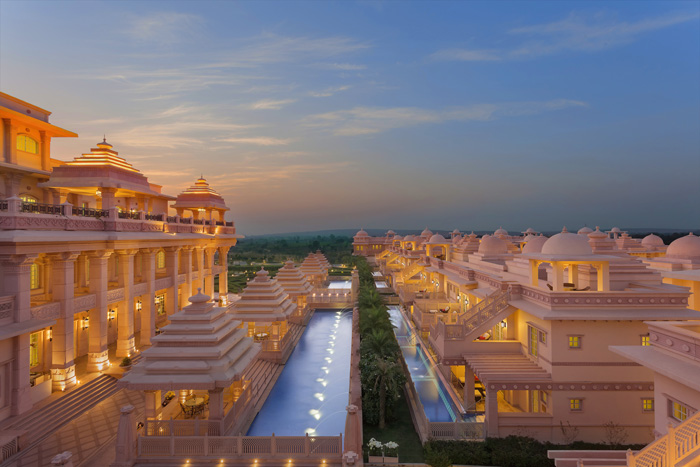
Your hotels are rooted in the soil of India, wherever you are, in whichever part of the country. You most recent hotel is the ITC Grand Bharat where you have put together the various components of the Bharat that you saw and crystallised them into one single property. Can the next decade see ITC venturing into Bharat and create unique and small projects and products through the country, as new kind of an experiential offering to Indian and foreigners?
Very possible. But I think it will take some time. Any business must also justify to its shareholders its return on the capital. You can’t always be gestating. The 4-5 years for us have been capital heavy. We bought the Goa property, which is a great hotel and a great experience. We built the ITC Kohenur; the Royal Bengal is a big one, ITC Grand Chola – all of them have come up in the past 5-6 years.
What is the pipeline right now?
In the pipeline, there is ITC Narmada in Ahmedabad. We have a hotel under construction in Bhubaneshwar, which is a WelcomHotel; we have a hotel in Guntur, in Andhra Pradesh. We have an ITC One in Colombo, which is a big bet.
What is the status of Colombo?
Technically, Colombo should have opened by the end of this year. It is delayed by six months because construction came to a standstill. That is another great property, iconic in many ways.
So, there is quite a lot on the drawing board. Plus, there are few management contracts that we are working on – some of them are under construction, and some of them undergoing the property improvement plan.
With one of our subsidiaries, we are looking at a hotel in Kathmandu. It is on the drawing board, another in Puri. Construction of a hotel in Srinagar had commenced but took a backseat. Depending on how the situation eases, we may want to start that as well. So, there is much going on.
As I said, it is an asset-right strategy, a combination of good opportunities that come by in good markets. Let us see how it evolves. This event (the Coronavirus) is going to redefine things, and I do not think many of us can predict everything that will happen. So, let us see how it evolves.
I often go back to thinking of the association that you and I were involved in, some 30 years ago, namely the New Delhi Hoteliers Forum. I find that an increasing number of subjects and concerns that a lot of cities have, and there is a macro-picture – which is FAITH. But I think each city, or at least, prominent cities need some kind of a local Hoteliers Forum. What are your thoughts?
We have been discussing this for a while as to how, and let me tell you, you have hit the nail on the head. If you very closely examine the demand of the industry, a lot of them are driven by the state governments, and we continue to hammer at the centre. Under FAITH, twice, we had all the tourism secretaries, along with tourism ministers, into one hall and debated our issues with them – effective or not, it was a move forward.
I again had a meeting with the tourism secretary a couple of days ago. He has promised to look into my proposal of holding a virtual conference with all the tourism secretaries. I have also proposed to do a virtual India promotion, of some form. Additionally, we have also decided to have state chapters of FAITH. Each person is going to identify which resource has better knowledge and better contacts locally to take it forward.
So, we are putting together such a list.
Any thoughts of doing things at a city-level, which is more local than doing things at a state-level?
NA: No. I don’t think we have gone to the city-level. But I think in many of the states when you look at the states- the attention goes to the cities. When we talk about Maharashtra, a lot of concern will come about for Mumbai, is not it? Because the association would be based in Mumbai. I think the point that you are making is how we can do things collectively. I think, in addition to some of the other things, the big advantage of putting together the general managers – they are the men on the feet- and I am not talking about an association of putting together general managers. It does not have to be from the lobbying point of view or a voice for the government, etc.
I think a lot that was achieved through the New Delhi Hoteliers Forum, such as the exchange of information about purchase costs, etc.
So, I think the objectives are different. I think to make our operations more viable; there can certainly be a general managers’ forum in every city.
In the last few weeks, as we were looking for fiscal stimulus for the travel and tourism industry, I think there were massive anticipation and expectation that the hospitality industry would get something. Then we got to a larger understanding that no sectoral stimulus was being visualised by the government, and they were going across the economy as a whole. There is some talk again that something will happen for the hospitality industry. What is your take on it? Are we still expecting something, or are we saying that we are not looking for money in our pockets? Are we looking for some policy relief in the form of sector reforms?
We are. Earlier there was a reform that in MSMEs, services were included what were at par with manufacturing. INR 200 crores or something. It was and/or. It was an investment. Somebody may not have a capital investment of INR 25 crores. That is directly a benefit to the hotel industry.
The RBI has passed a moratorium on loans for three months, which has now been extended to another three months. That has been a benefit to the industry. All of it, as you rightly said, came in the form of reform of a different kind, not necessarily for the industry. There is nothing specific for the industry.
There are some specific things that I hope the government would look at. Some of it is that would you incentivise domestic travel in the revival phase. If there is a way to incentivise domestic travel, how could you incentivise? Like in the old times, could the LTC that used to come back, become mandatory if it is domestic travel? So, how can the government help us revive the demand?
Also, it is all about future and in our first meeting with the tourism secretary, we did recommend that we should have the National Tourism Advisory Board once again, which should prepare the roadmap for the new India, which is being done. Let us hope we start work on that soon.
There are some specific demands.
In the revival phase, even in the survival phase, I think the GST should be made more competitive.
When international travel opens up, can we be competitive with the new nations with which we are competing? Today, we may be competing with Australia, USA, etc. but there is going to be a new world-order, and regional tourism will come about. To compete with say Dubai and Singapore, I need to change my reference and begin to compare my tax structure, the cost of a holiday, my infrastructure, the ease of passport and entry into the city. So, I think it will continue; it is never-ending.
Tourism was left out in the constitution of India. It neither made into the State or Concurrent List (nor the Union List). To get it into one of these is changing the constitution virtually. It is a constitutional amendment.
We must continue to work with the states, and we have done what we had to do with the states. I think more work at the centre is what is key to achieving the success of the industry.
I have always been a great believer that we suffer from a past where tourism was considered to be an elitist activity and not an economic activity. And therefore, we have to push tourism rather than creating a pull. I did a presentation a long time ago, saying “putting the cart before the horse.” On the contrary, you have to continuously tell the powers to be, the benefits of tourism; what can tourism do for you; demonstrate with examples that how it has been the engine of countries for many countries and cities. And, you will then automatically create a pull for tourism rather than a push for tourism. That would be a long-term vision.
On the one hand, we keep fighting for tactical relief and survival, but we have to change the perception of tourism in the longer term. I think India and we have the greatest opportunity to reinvent ourselves when the dust settles; we should not lose this opportunity; this will not come again.
Of cleanliness theatres, re-imagining hospitality, and finding new ways of touching the hearts of our customers
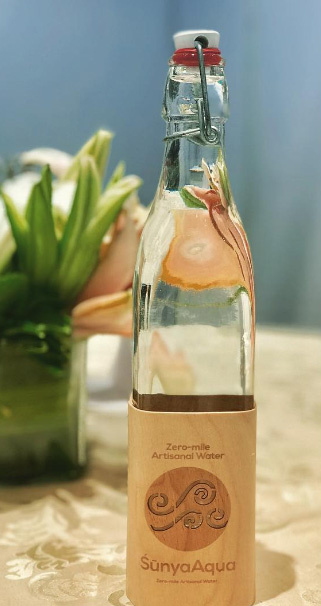
India as a country, we as an industry and I as a company and an individual, each of us will have to give visible proof of the new trends, of sanitisation. I was telling my team the other day that hotels will become what I call ‘cleanliness theatres.’ It is not enough just to eliminate the germs; you also must remove the fear among people. Normally, if you are cleaning the hotel in the night, you would also want to clean it during the day, so that people can see that they are being cleaned. We must give them tangible proof. If you would remember, we all grew up with the word ‘the moment of truth;’ this moment of truth would become what I call the ‘moment of trust.’ It is about trusting the brand that the brand would do that for me. Trust will be the new currency, and I believe that the brands that have worked over the years to build on the trust quotient can encash on these trends.
This is the age of sanitised travel and how people travel and stay in hotels will be totally different. And I think everybody that I know, across the industry, is gearing up for the same. And I see tons of things happening across the board – disinfecting becoming the new gatekeeper, technology, thermal screening, ozonisers, UV screenings, and others – all these would become a part of the daily life.
I did speak about security, and therefore, privacy will be a new luxury. That is what I call the ‘rise of distance.’
This will also trickle down to food and beverages. As I began by saying that the basic concern is that of health, which leads to sanitation and safe distancing – all these aspects are going to come into other aspects of hoteliering. For a while, I think buffets have had their last supper. I don’t think you will see buffets for very long. The big fat Indian wedding has gone on a diet. You are not going to see a big fat Indian wedding.
There is going to be different types of food and different styles of service. Room service could be kept outside your room with sterilised cloth, cutlery, etc. There will be a complete change. Even with food, people are going to go back to organic food, food that boost your immunity, all-natural and farm-to-table, all these trends are going to come back in the F&B domain. People are going to be careful about themselves and the planet; people won’t be wasteful in any manner. Somebody righty said, “let food be your medicine or medicine will be your food.” This is the right time for this to happen. Food has to become medicine.
I did mention about the infusion of technology. There is going to be a whole lot of digital, texting concierge, digital menus. Ideally, you would like to have a low-touch experience if you go to a restaurant. So, one envisages that there could be some sort of a QR code that comes on your phone from which you can order and pay. So how to keep up with services with the minimum levels of touch?
Sleep has been a crucial part, and I think it is only going to accentuate as people lay greater emphasis on health. People have gotten used to maybe sleeping a few extra hours, being at home. Let me give you an example: we began by saying that a man does not sleep alone and all the five senses – the sense of touch, sound, etc. We are now looking at what I call the biological factors, which is fatigue and the others. If I give you an example: we have studied positive neurotransmitters, such as M6, magnesium, etc. and we have introduced a food menu for sleep or a ‘sleep menu.’ We have a laboratory in ITC Windsor, and with the help of ITC Lifesciences Centre, we have measured the actual results against heart rate, rhythm and breathing, etc. and found out how good sleep has become. So, it has all become a science now, and things like these are going to accentuate.
In the longer-term, and I find this very interesting is how we are going to redefine our buildings. The way hotels are going to be built is going to be different. It was Churchill who had said that we define our building and then the buildings define us. It is believed, and I was doing a lot of reading, that till the Spanish Flu, buildings had pillars, arches, columns and multiple surfaces. The simplification of buildings occurred after the Spanish Flu. People decided that they needed cleaner surfaces. How could you maintain and clean them easily become important? Carpets began to dry up because they were dust-traps.
But I think there is a lot more that will happen in terms of acoustics, bacteria-resistant material and anti-bacterial switches and how the fresh-air system will be treated.
How can design render itself to cleanability and how can it render itself to safe distancing, without impacting the aesthetics – all these will be completely redefined. Rooms would be redefined. Could exercise be had in the room and not in the gym? Could the rooms be a little larger? This is another very important long-term impact that I envisage.
These changes would be much more permanent. Somebody asked me this question of whether service would become a commodity and service would become contaminated because it is all about touch. And I said that it is not the case and hoteliers in the service business have a different way of looking at it. You don’t touch the person, but how can you touch his heart and by touching his heart, how can you give him good service? You can’t see my smile because I have a mask, but how can my service bring a smile on to you.
Let me give you an example and what better example can I give you? By some strange coincidence, our forefathers at ITC chose the ‘namaste.’ ‘Namaste’ is a no-touch form of greeting, which is no way inferior to the handshake, isn’t it? It has the same impact, and I’m only quoting it as an example. You know I’m a great lover of this business, And I have studied extensively about service, and I believe we will keep the service levels better than what it was before. We will find new ways of touching a person’s heart, and you don’t have to touch the person. So, the service will totally get reinvented. So that is as far as giving a smaller picture of the industry is concerned.

